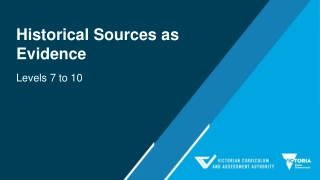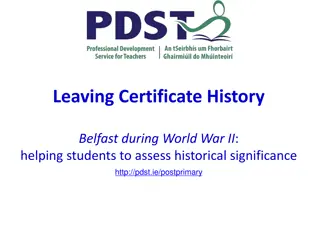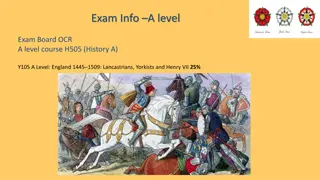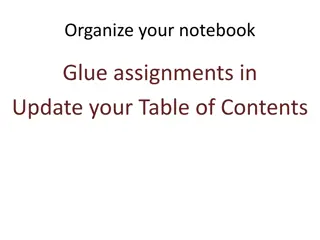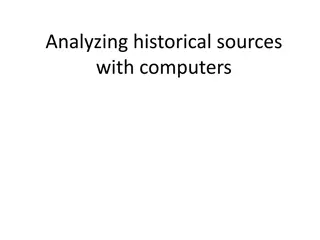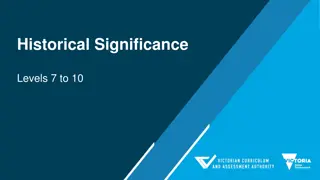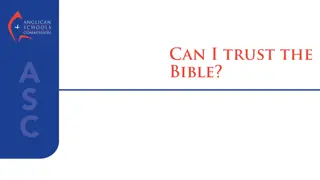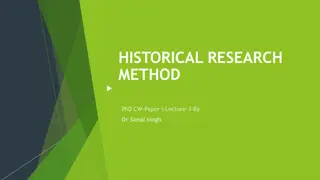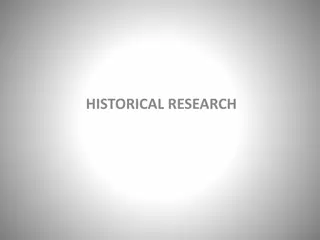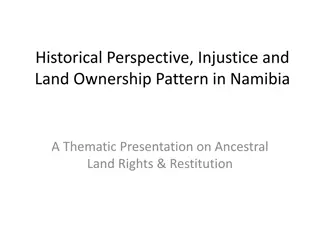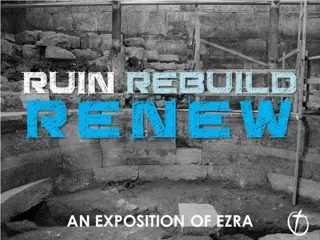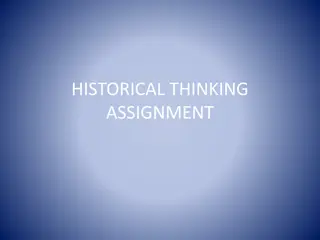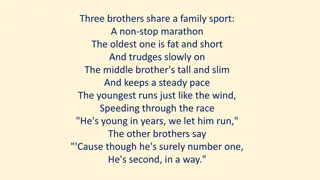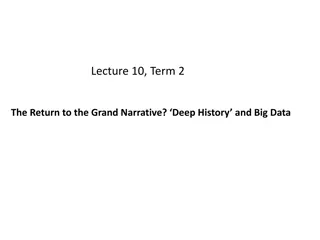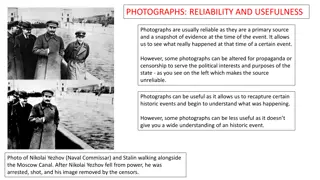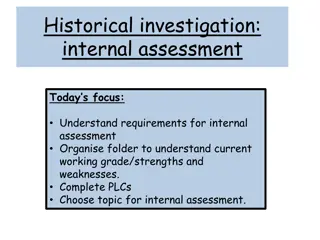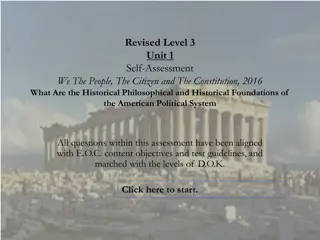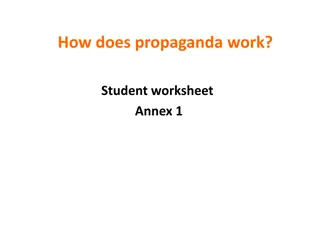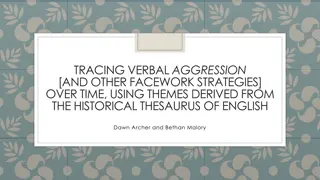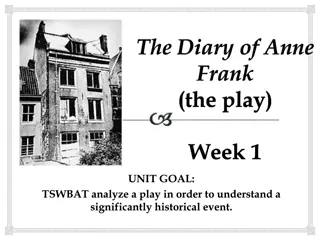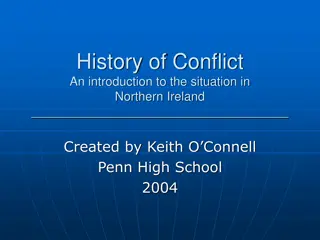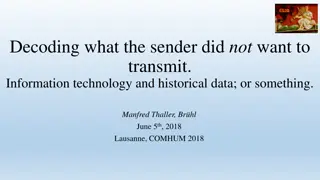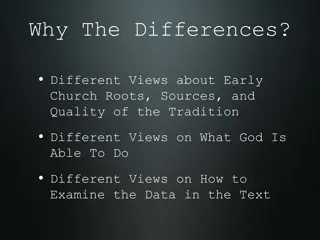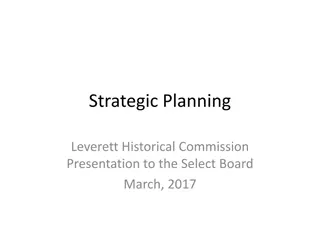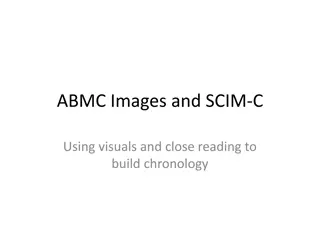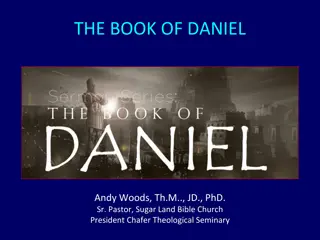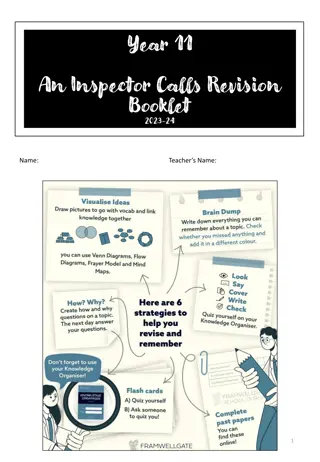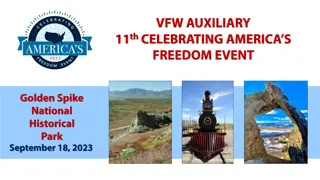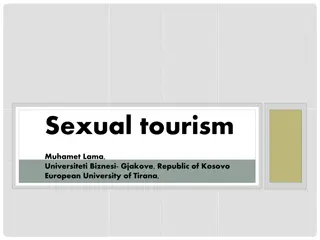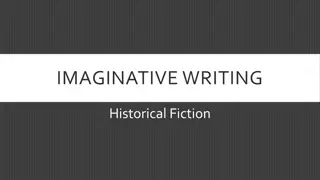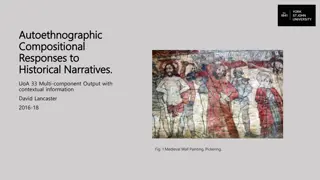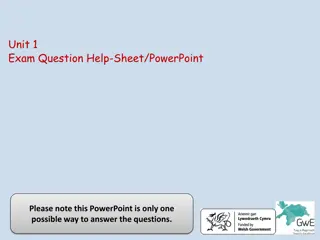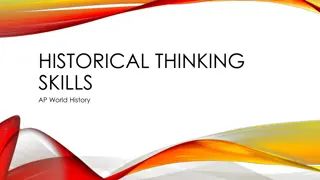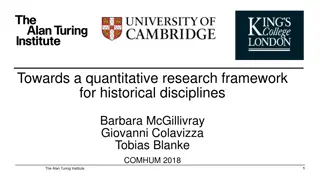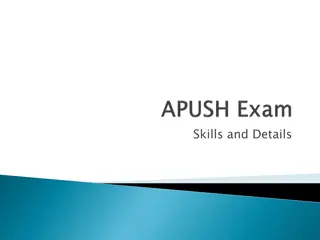Historical Sources as Evidence
Explore the importance of historical sources as evidence in the Victorian Curriculum History context, focusing on how students analyze, evaluate, and utilize sources to create historical explanations and arguments. Discover the significance of primary and secondary sources, perspectives of historica
1 views • 46 slides
Challenges and Solutions in Implementing Historical Competencies in Teaching
Explore the complexities and obstacles faced in implementing historical competencies in teaching, as discussed by Jens Aage Poulsen, a senior lecturer and researcher at HistoryLab, University College Lillebaelt, Denmark. The content delves into competence-based curriculum, core historical competenci
0 views • 7 slides
Exploring Historical Significance of Belfast During World War II
Assisting students in assessing the historical significance of Belfast during World War II through an enquiry-focused approach. The content covers key aspects such as the impact of World War II on Belfast, its strategic importance, political leadership, the Belfast Blitz of 1941, and key terms relat
0 views • 32 slides
Wars of the Roses (1445-1461): Source Analysis on the Downfall of Henry VI
This content delves into the Wars of the Roses period (1445-1461) in England, focusing on the outbreak of conflicts, political turmoil, and the downfall of Henry VI. It includes an inquiry topic, sample paper question, and a detailed analysis of a historical source (Source A) by Jack Cade regarding
0 views • 16 slides
Exploring Historical Fiction: Elements and Examples
Discover the essence of historical fiction, its key elements, and examples like "Forrest Gump." Learn how plausibility and interpretation play pivotal roles in creating captivating narratives that blend fiction with historical events.
0 views • 11 slides
Exploring Historical Analysis with Digital Tools
Delve into the world of historical analysis using digital methods like digitization, metadata, OCR, and balancing challenges. Discover how tools like Antconc can aid in machine-driven inquiries, statistical analysis, and more to extract valuable insights from historical sources.
0 views • 13 slides
Understanding Historical Significance in Victorian Curriculum History
Exploring historical significance levels 7 to 10 in the Victorian Curriculum History, this content delves into the importance of evaluating the past, identifying patterns of change, and assessing the influence of individuals and groups. Students learn to analyze causes, effects, motives, and interpr
0 views • 48 slides
Examining the Reliability of Historical Texts: From The Bible to Socrates
Investigating the unparalleled popularity of the Bible, the historical significance of Christianity, the reliability of documents related to Socrates, and the critical analysis of potential mistakes in historical texts through comparisons and archaeological findings.
2 views • 13 slides
Understanding Historical Research Methods
Historical research is a systematic approach to investigating past events, developments, and experiences. It involves critical examination of evidence, interpretation of sources, and tracing of historical trends to gain insights into social changes. Various definitions by scholars like Kerlinger, Wh
1 views • 21 slides
Understanding Historical Research: Methods, Purposes, and Aims
Historical research involves investigating past events systematically to provide a dynamic explanation, interpretation, and understanding of the past. It aims to uncover unknown aspects, answer unexplored questions, and link past happenings to the present to enrich human culture and encourage interd
0 views • 20 slides
Namibia's Ancestral Land Rights: Historical Injustice and Restitution
Explore the historical context of land ownership in Namibia, focusing on ancestral land rights, colonization processes, and the impact on indigenous populations. Learn about the notion of ancestral land, who should be considered indigenous, and the colonial modes of land acquisition. Uncover the str
0 views • 33 slides
Overview of Ezra: Historical Background and Key Details
Ezra and Nehemiah, two significant books written as one scroll in Hebrew, cover a historical period from 538-445 BC in Israel's history. The authorship of Ezra is traditionally attributed to both Ezra and Nehemiah, possibly also linked to the Chronicles. This period coincides with other biblical boo
0 views • 31 slides
Understanding Paragraph Organization in Historical Prose Writing
Explore the D-N-A structure of paragraph organization in historical prose writing, focusing on transitional words, revision strategies, and the inseparable connection between history and writing. Learn how to develop effective paragraphs that guide the reader through your historical narrative.
0 views • 18 slides
Key Historical Events and Perspectives
Explore significant historical moments such as the Kennedy Assassination, the First Moon Landing, and the FLQ Crisis, examining the impact of these events on society and the world. Discover the importance of historical thinking skills in analyzing causes, consequences, continuity, and change, as wel
1 views • 11 slides
Historical Events and Learnings in World War I Era
In this collection of historical topics, explore events such as the three brothers in a marathon, war strategies in World War I, and GCSE History lessons covering Germany and Britain. Learn about significant battles, alliances, and key figures from this era, including Kaiser Wilhelm II. A starter qu
0 views • 21 slides
The Role of History Writing in Contemporary Academia
The discussion revolves around the practice and purpose of history writing post-Enlightenment, exploring concepts such as human agency, historical change, and the historian's role. It questions the objectivity of historical facts, delves into the influence of the historian's environment, and contemp
0 views • 28 slides
Reliability and Usefulness of Historical Sources
Photographs, diary entries, and letters are valuable historical sources, providing insights into past events. While photographs offer a snapshot of the truth, they can also be manipulated. Diary entries reflect personal experiences authentically but may lack objective facts. Letters serve as private
0 views • 11 slides
Requirements for Historical Investigation Internal Assessment
Understand the 25% weightage internal assessment comprising 3 sections for a historical investigation. Focus on source evaluation, investigation, and reflection within a 2,200-word limit. Choose a historical topic, analyze primary and secondary sources, and consider causation, consequence, continuit
0 views • 18 slides
American Political System - Historical Foundations Self-Assessment
Explore historical, philosophical, and foundational aspects of the American political system through a self-assessment quiz. Assess your knowledge on constitutional government, limited government, and governance derived from the people as outlined by key historical figures.
0 views • 77 slides
Understanding the Mechanisms of Propaganda Through Historical Examples
Explore the workings of propaganda through historical artifacts from World War I, showcasing how nations used persuasive messaging to influence public opinion, rally support for war efforts, and shape cultural narratives. Images of propaganda posters and war bonds illustrate the powerful impact of v
0 views • 24 slides
Tracing Verbal Aggression and Facework Strategies Over Time
Dawn Archer and Bethan Malory explore the tracing of verbal aggression and other facework strategies over time using themes from the Historical Thesaurus of English. They utilize automated content analysis tools to analyze datasets from various historical periods and propose solutions for prioritizi
0 views • 41 slides
Understanding Historical Context in Skills Development Discourses
Exploring the evolution of apprenticeship and skills development through historical sociology, historical futures, modes of justification, and complexity concepts. Emphasizing the importance of nuanced historical understanding to navigate contemporary challenges in South Africa's skills development
0 views • 29 slides
Understanding the Historical Context of "The Diary of Anne Frank
The play "The Diary of Anne Frank" is based on the true story of a young Jewish girl named Anne Frank during the Holocaust in World War II. Through analyzing the play, students explore the significant historical event of the Holocaust, where millions of Jews were systematically persecuted and killed
0 views • 13 slides
Understanding the Conflict in Northern Ireland: A Historical Overview
Explore the complex history of the conflict in Northern Ireland, which is primarily between Protestants and Catholics, with roots in nationality, land rights, and historical events dating back centuries. Learn about the key beliefs, historical background, and significant dates that have shaped the o
0 views • 20 slides
Exploring Historical Data Through Information Technology
Delve into the intersection of information technology and historical data with Manfred Thaller at COMHUM 2018. Follow the journey of historical research tools developed to understand demographic behaviors, societal changes, and the impact of agricultural and industrial advancements on population gro
0 views • 85 slides
Understanding Diverse Perspectives on Early Church Traditions and Historical Jesus
Exploring different viewpoints on early church roots, sources, and the quality of tradition, as well as varying beliefs on God's abilities and approaches to analyzing textual data. Delve into the criteria for evaluating historical Jesus materials and considerations of authorship and orality in tradi
0 views • 17 slides
Leverett Historical Commission Strategic Planning Presentation Overview
Leverett Historical Commission identifies issues with ad hoc requests, lack of clarity on historical property significance, and inadequate maintenance plans. A strategic plan is needed to define assets, determine significance, create guidelines, prioritize restoration efforts, and establish funding
0 views • 9 slides
AP US History Course Overview & Expectations with Mr. Hromadka
This advanced placement course, led by experienced teacher Mr. Jeff Hromadka, focuses on diving into the complexities of US History from its early settlements to modern-day affairs. Students are encouraged to think critically, analyze historical events, and form their own informed opinions. The clas
0 views • 11 slides
Analyzing Historical Documents Using SCIM-C Model
The SCIM-C model provides a structured approach for analyzing historical documents through summarizing, contextualizing, inferring, monitoring, and corroborating information. It guides the reader in understanding the type of document, specific details provided, subject matter, audience, purpose, pro
0 views • 10 slides
Understanding Primary and Secondary Sources
Learn about the difference between primary and secondary sources through a quiz based on various historical materials such as Anne Frank's diary, textbooks, interviews, journals, and historical documents like the United States Constitution. Explore the significance of different sources in understand
0 views • 7 slides
Exploring The Book of Daniel: A Prophetic and Historical Overview
Delve into "The Book of Daniel" with Sr. Pastor Andy Woods as he provides insights into the prophetic and historical significance of this biblical text. Discover the revelations regarding the times of the Gentiles and the intricate layers of interpretation woven through the chapters. From the prophe
0 views • 118 slides
Exploring the Historical Context of 'An Inspector Calls' by JB Priestley
Explore the historical context surrounding the time period in which JB Priestley's play "An Inspector Calls" is set and was written. Delve into the significant events such as the sinking of the Titanic, World War One and World War Two, the class system, socialism vs capitalism, and the changing role
0 views • 30 slides
Explore Golden Spike National Historical Park
Discover the rich history of the Golden Spike National Historical Park located in Utah. Visit the official website for more information on this historic site where the first transcontinental railroad was completed. Immerse yourself in the stories of the past and witness the monumental significance o
0 views • 7 slides
Understanding Sexual Tourism in the Historical Context of Kosovo
Sexual tourism, a form of legal prostitution, has historical roots in Kosovo and its neighboring regions. This practice involves offering companionship and escort services to business travelers and tourists. The presence of prostitution in ancient Illyria suggests a long-standing tradition of sexual
0 views • 10 slides
Exploring Historical Fiction Writing Techniques
Delve into the art of historical fiction writing through thematic exploration, character development, and crafting compelling narratives set in specific historical periods. Enhance your skills in characterisation, setting, atmosphere, turning points, and climax by engaging in creative tasks such as
0 views • 28 slides
Exploring Historical Narratives through Music and Art
This submission presents two original compositions that delve into historical narratives through a unique blend of music and visual art. The compositions aim to reinterpret stories from the past, creating innovative structures and forms. By intertwining various perspectives and utilizing cinematic t
0 views • 8 slides
Historical Source Analysis Exam Questions Overview
The provided content outlines exam questions related to historical sources, guiding students on analyzing, evaluating, and interpreting information from different sources. The questions cover a range of topics such as learning from sources, assessing accuracy, understanding significance, and making
0 views • 12 slides
Developing Historical Thinking Skills in AP World History
AP History classes aim to cultivate apprentice historians by fostering historical thinking skills (HTS). These skills include Chronological Reasoning, Comparison and Contextualization, Crafting Historical Arguments, and Historical Interpretation. Each skill set equips students with the ability to an
0 views • 15 slides
Quantitative Research Framework for Historical Disciplines
Scholarly communities in historical disciplines are combining quantitative and qualitative methods to study phenomena that change over time. The proposed general methodological reflection aims to enhance research in historical linguistics through quantitatively driven models and claims. Quantitative
0 views • 18 slides
AP US History Exam Details and Strategies
Get ready for the AP US History exam with a breakdown of the test structure, key historical skills, thematic areas, and scoring rubrics. Learn how to approach multiple-choice questions, short answer questions (SAQs), document-based questions (DBQs), and long essay questions effectively. Explore the
0 views • 14 slides
